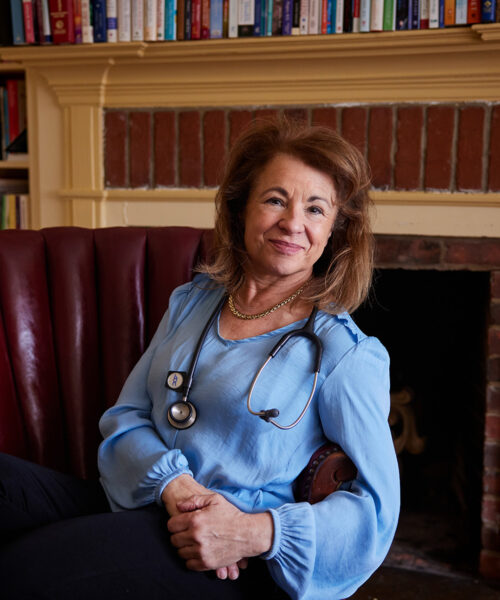February 26, 2024
A Holistic Approach to Healing Takes Many Paths
By Wendy Carlson
Photographer: Ryan Lavine
When Dr. Tamara Sachs examines a patient in her New Milford office, she looks beyond recognizing and treating the symptoms of their condition. Think of her more like a detective bent on tracking down clues to the root cause of the patient’s illness to determine the best path toward healing.
Sachs began practicing in New Milford more than 30 years ago after working for several years as an emergency room physician in New Haven. For a decade she was a primary care doctor in New Milford. In 1998, her focus shifted from conventional medicine toward functional medicine, a model that offers a more individualized, patient-centered, science-based approach, allowing patients and practitioners to collaborate in addressing the underlying causes of disease and promoting optimal wellness.
“Basically, I went back to my roots,” she says. Sachs earned a B.A. in molecular biology and philosophy at Hunter College. Then, after studying naturopathy in France for three years, she set her sights on medical school.
“I had the naive idea I would do research to prove that natural medicine worked,” she says. She graduated from Mount Sinai School of Medicine in New York City with honors and completed her residency in Internal Medicine at Saint Raphael Hospital and Yale University. But along the way she lost sight of her original goal.
“In medical school, it’s hard to think outside of the box when you are so involved in studying and training,” she explains.
While she enjoyed her time working in the emergency room and in primary care, it wasn’t what she went to medical school for. She wanted to understand how the human body works and to help people learn how to become healthier without becoming dependent on conventional medicine that addresses only the symptoms of an illness. So, in 2003 she began practicing functional and integrative medicine. Integrative medicine seeks to understand the whole person and uses many different types of therapy to heal mind, body, and spirit. Functional medicine seeks to identify and treat the underlying cause of a condition and creates individualized therapies.
“By addressing root causes, rather than symptoms, we become more aware of the complexity and interconnectedness of chronic disease,” Sachs explains, “One condition has many different causes and, likewise, one cause may result in many different conditions.”
This holistic approach takes into consideration each patient’s genetic, biochemical, and lifestyle factors as well as physical and mental traumas and uses that data to design personalized treatment plans. Sachs uses specialized laboratory tests in conjunction with uniquely comprehensive intake forms to assess nutrition, inflammation, oxidative stress, detoxification pathways, toxic load, and how certain gene variations called SNPs influence health, disease, drug response, and other traits.
Most importantly, she is passionate about helping people understand how their body works so they can have some agency over their own health. “I’m optimistic,” she says. “More and more people are seeking to learn about the connections between health, diet, and their life.” —tsachsmd.com






















